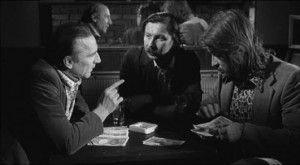STUDIO: Criterion | DIRECTOR: Aki Kaurismaki | STARS: Matti Pellonpää, Evelyne Didi, André Wilms, Kari Väänänen, Christine Murillo, Jean-Pierre Leaud
RELEASE DATE: 1/21/13 | PRICE: Blu-ray/DVD Combo $39.95
BONUSES: Essay by Luc Sante, interview with Andre Wilms, making-of documentary “Where is Musette?”
SPECS: NR | 103 min. | Foreign language comedy drama | 1.85:1 widescreen | monaural | Finnish with English subtitles
RATINGS (out of 5 dishes): Movie
| Audio
| Video
| Overall

A master of deadpan humor, the Finnish filmmaker Aki Kaurismaki (Leningrad Cowboys Go America) seems at first glance to be a cynic, but his films reveal him to be an old-fashioned sentimentalist. His low-key, beautifully shot 1992 B&W comedy-drama La Vie de Bohème harkens back to the French cinema of the Thirties and Forties, as well as its highly romantic source material, Henri Murger’s famed novel Scenes de la vie de bohème (which was adapted by Puccini for the opera La bohème).
As is often the case with Kaurismaki’s work, one can’t be entirely surely what era the film is set in — his characters seem to exist in a present in which elements of the plot are everywhere. Here he chose not to shoot in Paris, opting instead for the southern suburb of Malakoff, which still had the “bohemian” aspect he was looking for.
The plot concerns an artist (Matti Pellonpää), a composer (Kari Väänänen) and a writer (André Wilms) who all struggle to subsist on very little money. They occasionally benefit from the kindnesses of rich strangers — played by guest stars Jean-Pierre Leaud, Sam Fuller and Louis Malle — but for the most part they take the path chosen by most of Kaurismaki’s heroes: smoking, drinking and listening to old records. As the film continues, we eventually move toward the famous ending of La bohème in which the writer’s girlfriend is dying of consumption.
The quietness and deadpan sarcasm indulged in by the protagonists requires a special sort of performer. Luckily, Kaurismaki had his dream cast here, with his two best male Finnish actors (Pellonpää and Väänänen) on hand, as well as his go-to French lead Andre Wilms, who is quite impressive as a “later” version of the character he plays here in Kaurismaki’s Le Havre (2011).
The female leads do a fine job of remaining as quiet and sarcastic as the men, especially Evelyne Didi as the doomed Mimi. The trio of guest stars root the film in a tradition of independent cinema and a bohemian past. Leaud in particular brings so many associations with him that one can’t help but think of the great French cinema of the Sixties and Seventies whenever he appears on screen.
Kaurismaki’s French cinematic influences — Becker, Melville, Bresson — are cited directly or indirectly in the film. The extras confirm the special nature of his subdued and brilliant approach and its debt to the French masters. In a 2012 interview with Wilms, the actor discusses the informal yet very tightly composed nature of Kaurismaki’s work and clarifies what he sees as Kaurismaki’s view of Paris and the bohemian life. He also passes on the greatest lesson he learned from his friend Aki: how to behave convincingly drunk on camera.
The central supplement is a making-of documentary called “Where is Musette?” We hear from every significant participant here (including Leaud and Fuller), but the focus, naturally enough, is on Kaurismaki. He is always incredibly serious in interviews (making his deadpan sarcasm even funnier), but here he seems somber verging on catatonic. His most interesting reflections concern how his films are different from mainstream productions — a fact illustrated nicely by a scene in which a moving piece of scenery creates the illusion of a train leaving a station (because it was too costly to shoot at the Gare d’Austerlitz).
On the subject of the bohemian life, a British crew member and Wilms testify in the extras to the fact that Pellonpää (who died in 1995 at the age of 44) was the one true bohemian in the troupe. His non-acting regimen, according to Wilms, consisted of sleeping on the floor of Kaurismaki’s office, waking up and going to the local café for drinks.
|
Buy or Rent La Vie De Bohème
|
|||
|---|---|---|---|
Blu-ray/DVD Combo |
 Blu-ray/DVD Combo Blu-ray/DVD Combo |
 Blu-ray/DVD Combo Blu-ray/DVD Combo |
|

Leave a Reply